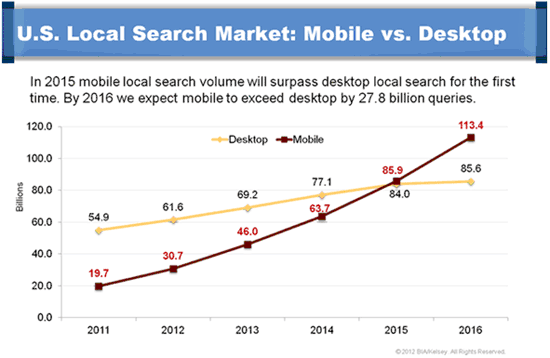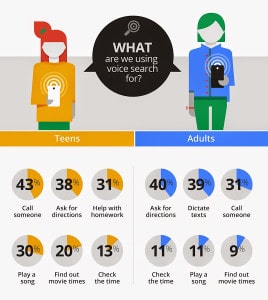Google, on the mobile device, with voice assistant. That would be how you would describe the death of the website if this were a game of CLUE and it was said by your kids looking back on history in 20 years. The website as of this year is starting to die a slow and painful death, and the culprit is right in your pocket, or hand, or on your table, or ceiling.
There are 5 major voice assistants on the market today that aim to make everything easier; Siri, Google App, Cortana, Hound, and Alexa. 4 out of these 5 apps come from major tech companies Apple, Google, Microsoft, and Amazon respectively (Hound is by SoundHound, a music app). So what do these have to do with the death of the website?
At first it seemed like voice search might die before it even got really started and was more of a gimmick between battling tech giants for mobile phone sales. Siri had been on the market since 2010 and Google’s own voice search app since 2012, but neither had shown major market penetration with 4/5 iOS users saying they did not use Siri by 2013. Gogle and Apple were not alone, Microsoft took a lot of flak in 2013 when they began to incorporate voice powered actions into the new Xbox One. The internet was angry over privacy as devices that wanted you to talk to them needed to sit and wait to hear you say something. Then a year passed and something changed, by late 2014 teens had been shown to embrace voice search technology. And a large percentage of adults said that voice search was the future.
The market had indeed changed. The ubiquity of voice powered devices and their ease of use had apparently won over younger users as the large tech giants leveraged their combined marketing clout to show users how voice could help them. In a year complaints about privacy issues and user interfaces waned, jokes about Siri and Google’s App turned to revelations about how useful the were, and Microsoft’s initial fumbles turned to praise with celebrity filled advertisements.
At the beginning of last year I predicted the onset of the voice powered search age when Google purchased NEST labs. Google’s purchase of NEST Labs at the start of 2014 signaled the desire for the company to put voice search in the home to set itself up for a war with Microsoft who had overcome their early hurdles and succeeded in getting the Xbox One into millions of homes (10 million by November, 2014). A silent war had began not just over the future of mobile and in-home tech interactions, but over the future of the common website and how discovery of content and answers happens.
Video – Teach Them Young: Google’s October 2015 ad shows several people using the voice powered search including a young girl using the app to learn about breakfast, without ever seeing a website or ya know talking to her dad.
Google didn’t just launch their Voice assistant in 2012, they also launched something they call the Knowledge Graph. This was Google’s way of attempting to answer a query without visiting a website, most often those posed as a question, and appears at the top of search results or along the right hand side in place of ads. Google does most of this by scraping, the process of taking content from one site and placing it on another, something many webmasters feel is a violation of the ‘handshake’ between a search bot and a website. The largest source of Google’s scraped answers is Wikipedia, but they also take answers from FAQ pages, Q and A websites, News articles, Sports stats websites, and more. If the content is visible to Google’s search bot, it has scraped it and could possibly display it in it’s search results. (Google (and Bing’s) ability to do this is seen as a gray area under current copyright law, but so far no legal challenges have successfully made it into the court system.)
Just as it seemed Google, Microsoft, and Apple were set to do battle, a new player entered the game. Amazon dropped the gauntlet in June of 2015 with it’s low cost Echo, a small cloud-based voice powered speaker with an assistant named Alexa. Alexa was the first stand alone home appliance for the voice powered age beating Google to the punch and angling for Microsoft’s Xbox dominance in the space. The battle only grew more when SoundHound introduced Hound (no clue when this happened). As of this writing Google appears to be winning the war followed by Siri, then Alexa, then Cortana, then Hound. My friend and ex-Microsoft employee and current Microsoft fan Duane Forrester discussed this with me in Las Vegas last month where he revealed to me that Siri and Alexa are at least partially powered by Cortana.
The Problem with Voice Search
There is absolutely no way to opt out
That’s where things get interesting. When Google’s App (or any other assistant) uses a website’s content to answer a question or help a user complete a task via voice, it’s possible that the user now has no reason to go to the website. Google and the other voice apps have also, as of writing this blog post, not yet began sharing any data on how frequently a knowledge graph snippet is used to answer voice questions and if that user completed an action such as visiting a website after hearing the answer. Google also does not always get the name of a website correct when the voice app tries to give attribution (for example instead of ESPN (ee-ss-pee-n.com) the app says ‘es-pen.com’) further complicating any value marketers and business might get out of voice search. There is absolutely no way to opt out of Google or any other voice app stealing your content and giving you the option to provide a partial answer or opt out of voice answers completely – unless of course you don’t want Google or Bing to rank you in search at all. In fact to encourage webmasters to help Google’s data collection they have asked webmasters to use rich markup language to help them steal scrape your content for their voice app and knowledge graph.
The problems
- No data on when voice is used
- No way to convert voice answer users to website visitors
- No way to track users from voice answers to website visitors
- No way to track phone calls from voice answers
- No way to easily drive leads from voice answers
- No way to correct the pronunciation of your website name
- No way to tell voice apps how to answer a query
- No way to opt out of voice without opting out of all search

The End
We know that youth powers technology trends, we also know that certain trends change over time. We know for a fact that mobile usage is increasing, that in areas like Africa mobile is more prevalent than desktop usage. We know that in the USA mobile search will eventually out pace desktop searches (in 2015 sometime is the guess), Google claims it happened on May 5th but provided no data. And we know that as teenagers and millenials get older and become a larger part of the marketplace, they’ll take with them the affinity for voice powered search.
All of this points to a clear and concise begining of the end for the good old website. Eventually the voice app wars will end and one or two engines will stay dominant. As this happens users will find your business in a variety of new ways, many that don’t require a website at all, and many that will require you to pay. The website is will soon be dead. It might live on as a way to feed data into a search engine in hopes of gaining some value out of voice search and the few people using their computers from work, but within a decade the role of the common website will likely give way to a new form of marketing content, one more controlled by the engines and less by the business.
More Video Ads for Voice Search Assistants
Amazon Echo
Microsoft Xbox Voice
Siri “Prince Oseph” Ad



